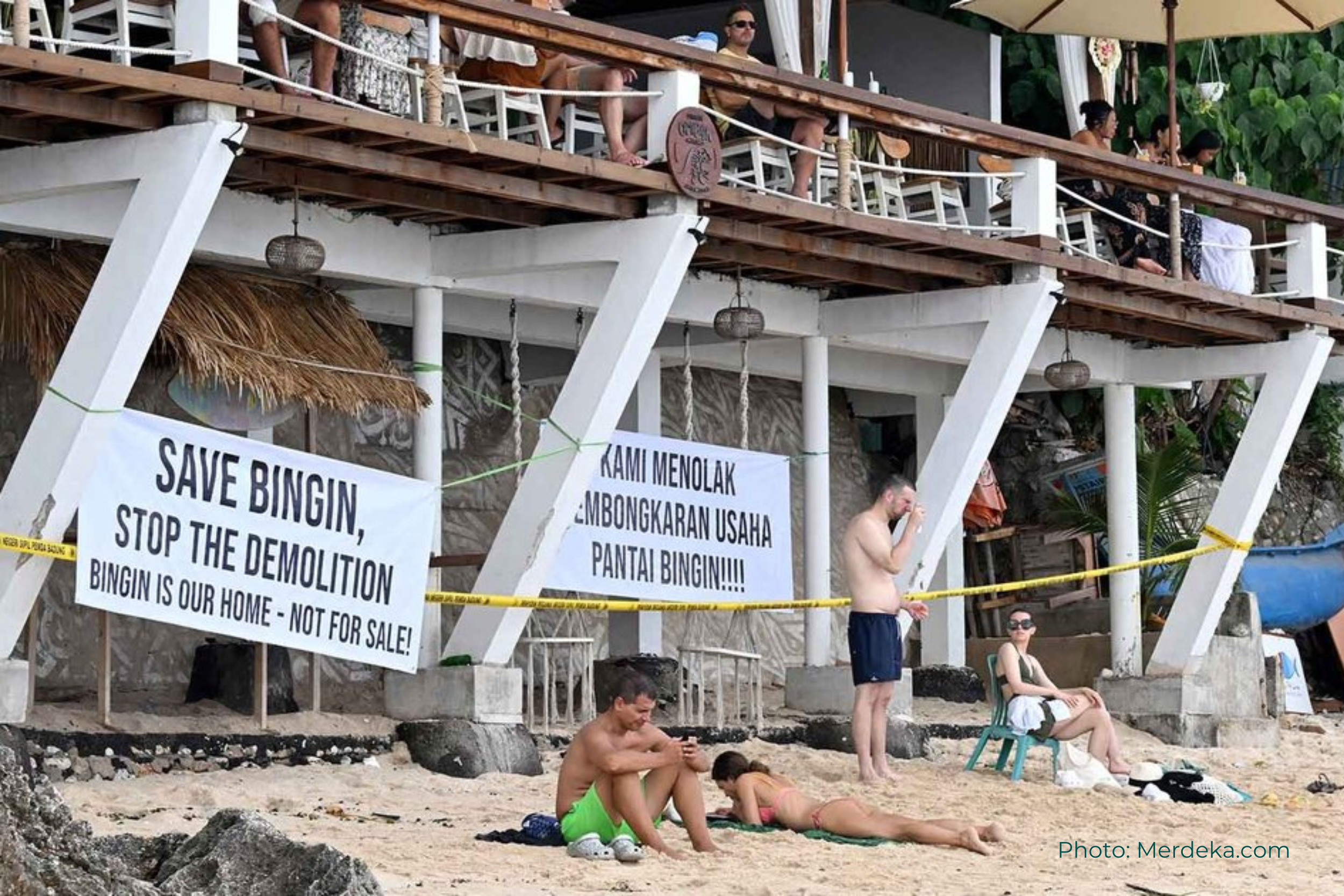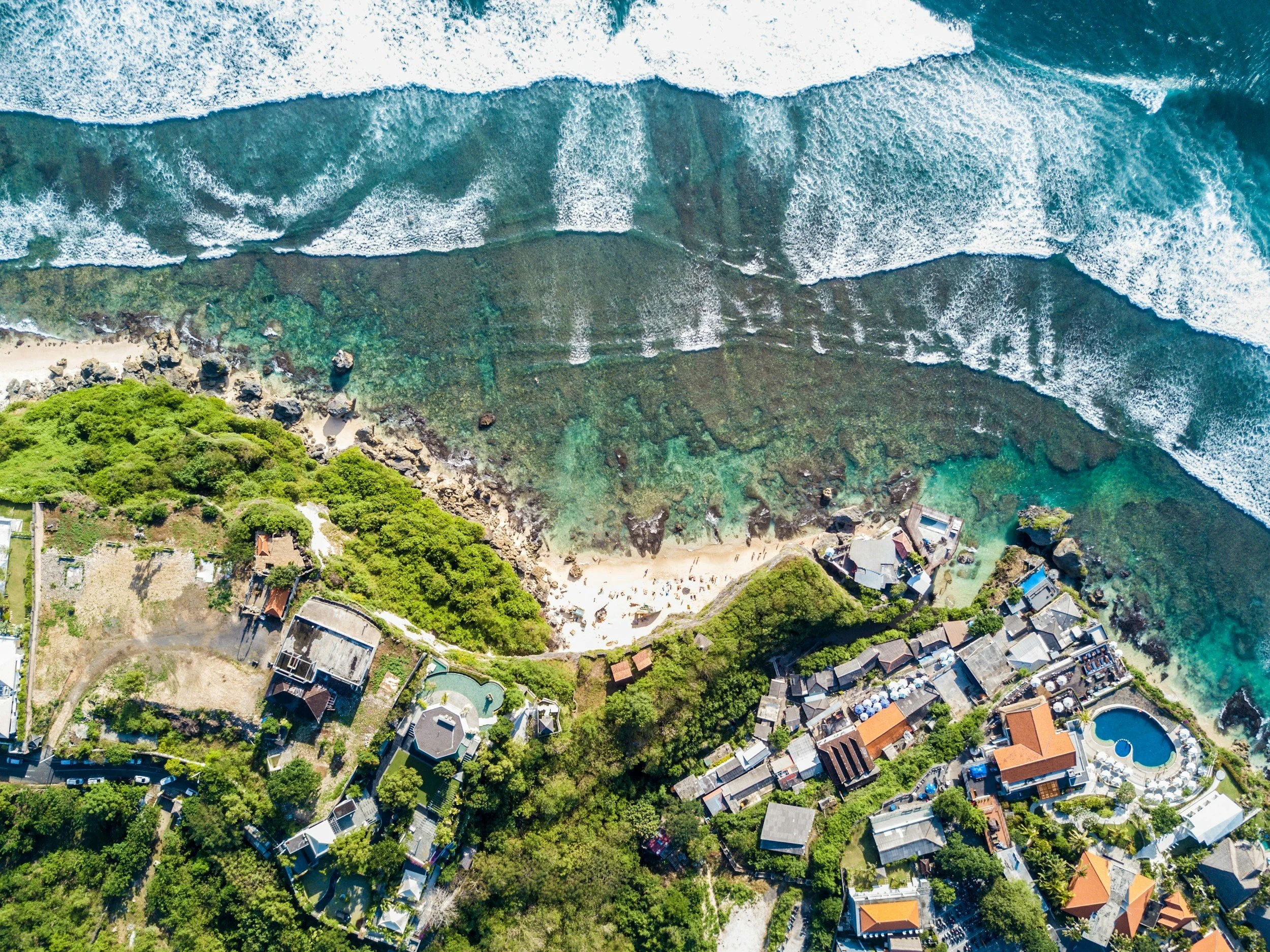Building Crackdown Hits Bingin: What’s Changed?
Authorities commenced demolition more than 40 illegal cliff‑side structures at Bingin Beach on July 21, 2025, citing violations of spatial planning, coastal protection, and state land rules.
Photo source: merdeka.com
The 21st of July 2025 saw an event that sent shockwaves across both Bali and the wider world: the demolition of over 40 properties on Bingin Beach, a long-time haven for surfers since the 1970s, and a favourite hotspot for both tourists and locals alike. Building owners received notices on the 25th of June and were given two weeks to voluntarily dismantle their properties. The sight of beloved businesses being torn down has sparked questions about important issues that Bali is currently grappling with, such as development, environmental protection, building regulations and how these areas affect local communities.
What Happened?
Satpol PP, Bali's civil police unit, had been investigating the area for months prior, identifying over 40 buildings that had violated planning laws, zoning requirements and building regulations. Demolition warnings were given to the properties, which ranged from warungs built as early as the 1980s to newer modern villas and guesthouses, on July the 16th. Despite negotiations going back and forth between businesses and the Badung Regency Government, a team of 500 was sent to start enforcement on the 21st of July.
Several business owners tried to put up a legal challenge against the demolition, stating they had not been given sufficient time to vacate or disassemble their properties. Yet, those affected include not only the businesses involved, but also the hundreds of workers who depended on them or beach-bound tourists for their livelihoods. Many have expressed fear about the future, wondering how they and their families will deal with such an abrupt change in circumstances and a sudden lack of earnings.
Bingin also served as a meeting place for communities of both locals and tourists who have been frequenting the beach and its establishments for decades, and the public reaction has been predominantly one of sadness about losing a place that meant many things to different people.
Just or Unjust?
Despite the negative reaction from both local and expat communities, there are real reasons for the steps taken, including preventing further ecological damage and upholding the law. Coastal areas act as a barrier from erosion, storms and rising sea levels, and as in the case of Bingin, are generally green zone land which cannot be built on. As environmental issues become more widespread both globally and across Indonesia, making sure these buffer zones are not endangered by unregulated building or large developments is becoming more important.
Many of the properties were built in accordance with Balinese customary law, which is known as ‘adat’ and focuses on community stewardship and harmony with nature. These local agreements don’t represent Indonesian zoning and planning laws that require all developments to be in line with land use classifications. Therefore, in terms of national law, these properties are still deemed as illegal.
Nevertheless, questions remain about the future, as plans have not yet been made public regarding the environmental restoration that will ensue after the businesses have been torn down, or what will fill their place.
Multiple villas and businesses were dismantled at Bingin Beach as part of an official effort to address land-use and permit compliance.
A Shift in Direction
The Bingin enforcement action signals a shift in how Indonesian authorities are planning to treat the oversight of building regulations going forward. In previous years, approval through Balinese customary law or certain land zoning loopholes may have sufficed when building new developments. Nowadays, despite the temporary social and economic disruptions that closures or demolitions may cause, it seems the government is prioritizing stricter regulations and enforcement.
As such, for those working in Bali’s business or property sector, or anyone looking to build their own home, it is increasingly important to make sure you understand zoning regulations and environmental restrictions. If you’re planning on building in an environmentally sensitive area, make sure you get both the area and documentation properly evaluated before proceeding. It may be the case that a business or property has historically operated without issue, but it’s important to note that this, nor informal agreements, will necessarily protect your assets if you’re found to be violating Indonesian national law.
Protect Your Investment
As can be seen from this instance, as well as other recent events like the closure of PARQ Ubud and villas in Canggu and Uluwatu, having the right building licenses and obtaining land in the correct zone is absolutely necessary. Whether you're planning a development, operating a business or concerned about existing properties that you own, getting the advice of an expert can help you protect your investment.
We are Bali’s premier business consulting agency, Bali Solve, and our team can guide you with comprehensive business advice to make sure you stay compliant and on the right side of the law. If you’re confused or overwhelmed when it comes to understanding the ever-changing property or business regulations in Indonesia, reach out to one of our friendly consultants today or schedule an appointment on Whatsapp so we can help you make sure that your investment is safe and secure.
Written by Bali Solve Team
26 July 2025


